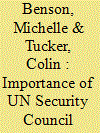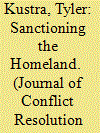|
|
|
Sort Order |
|
|
|
Items / Page
|
|
|
|
|
|
|
| Srl | Item |
| 1 |
ID:
185671


|
|
|
|
|
| Summary/Abstract |
Scholars have long examined the relationship between natural resources and conflict at the country level. More recently, researchers have turned to subnational analyses, using either individual countries or subnational data for a small number of resources in sub-Saharan Africa. We introduce a new sub-national dataset of 197 resources that adds many resource types, locations, and countries from Africa, the Middle East, Asia, Latin America, and Europe. To demonstrate the value of the new dataset, we examine how conflict incidence varies with the value of the collective set of resources in a given location using world prices. We then introduce new country-specific price data, which are more relevant for conflict dynamics. Since country-specific prices can be endogenous to conflict, we instrument country-specific prices using U.S. and world prices. We find that sub-national resource wealth is associated with higher levels of conflict using some specifications, though the results vary widely by data source and world region. Using an instrumental variables strategy lends the strongest support to this positive relationship, but only for African countries. Notably, across all of our models, we find that resources are negatively associated with conflict in Latin America, suggesting heterogeneity of effects worth future exploration.
|
|
|
|
|
|
|
|
|
|
|
|
|
|
|
|
| 2 |
ID:
185674


|
|
|
|
|
| Summary/Abstract |
The influence of United Nations (UN) peacekeeping in civil conflict has received important consideration in a growing body of literature. Little research, however, has focused on UN Security Council (UNSC) resolutions and their ability to determine and affect peacekeeping. New data on UNSC resolutions coded to UCDP/PRIO internal conflicts with peacekeeping operations (PKOs) is presented here. The data illustrate that resolutions vary importantly across conflicts and missions regarding their timing, sentiment toward rebel and government factions, level of action, mandates, authorized force levels, and substantive policies. Through a series of negative-binomial regressions using conflict-month replication data, we demonstrate that PKOs with both higher troops levels and a higher intensity of resolutions that condemn rebel actors experience a significant reduction one-sided rebel violence against civilians. In short, UNSC resolutions differ importantly before and during peacekeeping operations and may have an important impact on PKO effectiveness in civil conflict.
|
|
|
|
|
|
|
|
|
|
|
|
|
|
|
|
| 3 |
ID:
185672


|
|
|
|
|
| Summary/Abstract |
How have understandings of fundamental norms of international society changed over time? How does this relate to the decline of interstate violence since 1945? Previous explanations have focused on regime type, domestic institutions, economic interdependence, relative power, and nuclear weapons, I argue that a crucial and underexplored part of the puzzle is the change in understanding of sovereignty over the same period. In this article, I propose a novel means of examining change in these norms between 1970 and 2014 by analyzing the content of UN Security Council resolutions. This analysis is then utilized in quantitative analysis of the level of violence dispute participants resorted to in all Militarized Interstate Disputes in the period. I find that as liberal understandings of fundamental norms have increased, that the average level of violence used has decreased. This points to a crucial missing component in the existing literature: that institutions can only constrain when political actors share the right norms.
|
|
|
|
|
|
|
|
|
|
|
|
|
|
|
|
| 4 |
ID:
185676


|
|
|
|
|
| Summary/Abstract |
Gross domestic product (GDP), GDP per capita, and population are central to the study of politics and economics broadly, and conflict processes in particular. Despite the prominence of these variables in empirical research, existing data lack historical coverage and are assumed to be measured without error. We develop a latent variable modeling framework that expands data coverage (1500 AD–2018 AD) and, by making use of multiple indicators for each variable, provides a principled framework to estimate uncertainty for values for all country-year variables relative to one another. Expanded temporal coverage of estimates provides new insights about the relationship between development and democracy, conflict, repression, and health. We also demonstrate how to incorporate uncertainty in observational models. Results show that the relationship between repression and development is weaker than models that do not incorporate uncertainty suggest. Future extensions of the latent variable model can address other forms of systematic measurement error with new data, new measurement theory, or both.
|
|
|
|
|
|
|
|
|
|
|
|
|
|
|
|
| 5 |
ID:
185673


|
|
|
|
|
| Summary/Abstract |
Why do some immigrant groups succeed in influencing the U.S. government to impose economic sanctions on their former dictators, while others do not? This paper begins by noting that the president is the pivotal player in sanctions policy and that presidents cater to voters in swing states. Therefore, a diaspora’s proportion of the swing-state electorate should determine whether the American government imposes sanctions on their former homeland. Considering dictatorships from 1946 to 2005, this paper finds that a one-percentage-point increase in the diaspora’s proportion of the swing-state electorate increases the probability of regime-change sanctions by 11 percentage points. It then calculates causal estimates of the effectiveness of these sanctions on regime change. Using the diaspora’s proportion of the swing-state electorate as an instrumental variable for the presence of economic sanctions, it finds that sanctions do not have a positive, statistically-significant impact on regime change while a negative impact is plausible.
|
|
|
|
|
|
|
|
|
|
|
|
|
|
|
|
| 6 |
ID:
185675


|
|
|
|
|
| Summary/Abstract |
In this paper, we analyze the relationship between ISIS propaganda content and ISIS-inspired attacks by those outside of the group’s control. We examine the content of ISIS’ English language magazines, as well as speeches by two of its top leaders. We find that statements made about enemy countries in most contexts are not associated with a higher likelihood of violence in those countries. However, when a country is mentioned in ISIS propaganda in the context of its participation in the air campaign, this corresponds to an increased likelihood that the country will experience a violent attack. This suggests that propaganda highlighting key military adversaries may play a role in directing attackers that are outside the control of the organization’s hierarchy to the group’s preferred targets.
|
|
|
|
|
|
|
|
|
|
|
|
|
|
|
|
| 7 |
ID:
185677


|
|
|
|
|
| Summary/Abstract |
Television is an overlooked tool of state building. We estimate the impact of televising criminal proceedings on public use of government courts to resolve disputes. We draw on survey data from Afghanistan, where the government used television as a mechanism for enhancing the legitimacy of formal legal institutions during an ongoing conflict. We find consistent evidence of enhanced support for government courts among survey respondents who trust television following the nation’s first televised criminal trial. We find no evidence that public confidence in other government functions (e.g. economy, development, corruption) improved during this period. Our findings suggest that television may provide a means of building state legitimacy during war and other contexts of competition between political authorities.
|
|
|
|
|
|
|
|
|
|
|
|
|
|
|
|
|
|
|
|
|